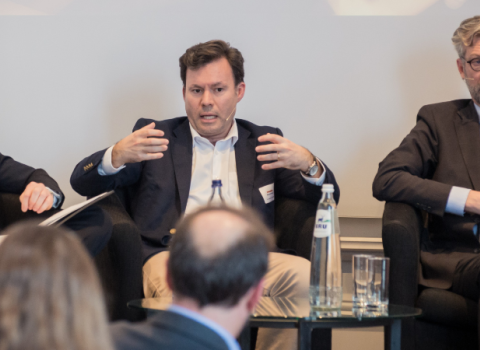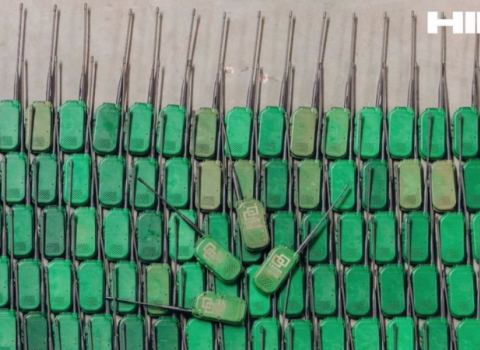The European Parliament approved committees dedicated to public health and to security and defence, in a push for more EU-level coordination

MEP Marie-Agnes Strack-Zimmermann, chair of the subcommittee on security and defence. Photo credits: Philippe Buissin / European Union
The European Parliament has voted to set up two new committees on security and defence, and on public health, upgrading these major policy areas from being subcommittees attached to the foreign affairs and environment committees, respectively.
The number of members in each will rise, from 30 to 43. However, it is unclear how involved these new bodies will be in shaping research and innovation programmes.
“The European Parliament must play a central role when it comes to defence and security,” Marie-Agnes Strack-Zimmermann, chair of the subcommittee on security and defence (SEDE), said following the vote. It is urgent Europe has its own defence strategy, referring to Russia’s invasion of Ukraine as a “litmus test” of whether Europe is prepared to defend itself.
“We should expect that if [Vladimir Putin] is successful in Ukraine, then he will turn his attention to Ukraine’s neighbours, and that includes Poland, the Baltic nations, and any country that shares a border with Russia,” Strack-Zimmermann warned.
The situation is all the more urgent following the election of Donald Trump. “The hope that the US will come and save the day is naïve,” she added.
Defence research
The mandate of the upgraded committee will extend to “defence-specific research, development and innovation, joint production and life-cycle management”.
This suggests members will have a say in the future of the €7.9 billion European Defence Fund (EDF). It’s less clear whether they will be able to influence Horizon Europe, which already funds civil security research, or its successor Framework Programme 10 (FP10), for which the Commission is considering including dual-use projects with military potential.
The mandate will though cover capabilities to monitor and counter hybrid threats, such as cyber-defence, the protection of space assets, and the security of defence-related critical infrastructure.
“We have huge potential danger that European satellites will be attacked, and if these are destroyed then we will immediately notice,” Strack-Zimmermann said, stressing the need to work with defence and space commissioner Andrius Kubilius, and with Henna Virkkunen, commissioner for tech sovereignty, security and democracy.
The defence committee will also be responsible for, “the progressive framing of a common [EU] defence policy leading to a common defence union”, and measures for industrial integration, with a view to creating a single market for defence.
When it comes to defence, the EU’s scope for action is limited, but the recent appointment of Kubilius as the first dedicated commissioner for defence indicates the Commission wants to foster closer collaboration between member states.
“Perhaps we are on a path, and this may be the first step towards a European Defence Union,” Strack-Zimmermann said of the new committee.
“At the moment, it’s the heads of state and government and the defence ministers who are making the decisions. But when it comes to procurement, when it comes to research, there we can work together, and can also make ourselves more independent from the US market.”
In addition to EDF, which launched in 2021 to fund cross-border R&D projects, earlier this year the Commission proposed a €1.5 billion European Defence Industry Programme (EDIP) including support for joint procurement.
Strack-Zimmermann said SEDE would look closely at EDIP, and had discussed transferring some responsibilities for procurement from the industry and research (ITRE) committee and from the transport committee relating to military mobility. More details should come in January, she said.
Public health committee
Much like the war in Ukraine has exposed the need for more coordinated defence spending, the COVID-19 pandemic provided the impetus for more joint action to tackle public health threats.
The new public health committee (SANT) will take over a number of responsibilities from the environment, public health and food safety (ENVI) committee. These include pharmaceuticals and medical devices; health crisis preparedness and response; and the European Medicines Agency.
SANT should also take over responsibility for the EU4Health programme, and could provide an opinion on FP10, although ITRE is expected to lead the negotiations.
“As we saw during the hearings and plenary debates, President Ursula von der Leyen and the new College of Commissioners are ready to work to complete the EU’s health union, but they need a serious partner, with an appropriate democratic mandate and understanding citizen’s needs,” said subcommittee chair Adam Jarubas.
Priorities would include replicating Europe’s €4 billion Beating Cancer plan in other areas such as cardiovascular and neurodegenerative diseases, and developing a “brain health strategy” that includes neurological and mental health.
Parliament also announced two new special committees, one on the housing crisis, and the other on the Commission’s upcoming “Democracy Shield” initiative to counter foreign information manipulation and interference online.
Members of all new committees will be announced during Parliament’s 20 - 23 January plenary session.





 A unique international forum for public research organisations and companies to connect their external engagement with strategic interests around their R&D system.
A unique international forum for public research organisations and companies to connect their external engagement with strategic interests around their R&D system.